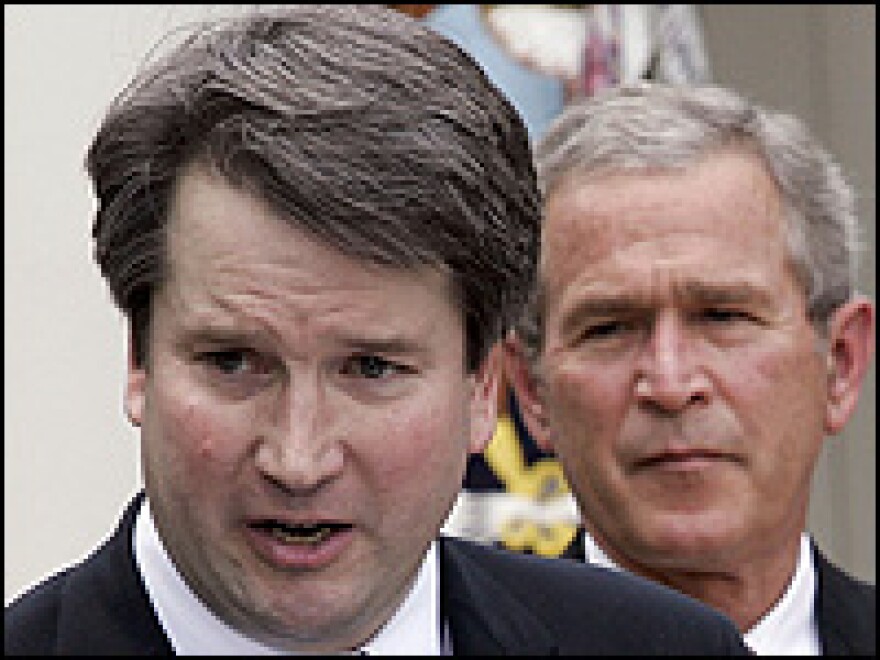One of President Bush's most controversial judicial appointees, Brett Kavanaugh, may have been less-than-forthright with Congress at a crucial hearing last year to confirm his appointment to a seat on the powerful federal appeals court in Washington, D.C.
Kavanaugh told senators in May 2006 that he "was not involved in the questions about the rules governing detention of combatants" during his time as a White House lawyer. Now, it is clear that Kavanaugh took part in at least one White House conversation about detainees.
During last year's confirmation hearing, Illinois Democrat Sen. Dick Durbin asked Kavanaugh about William Haynes, who helped craft harsh interrogation policies and was later nominated for a judgeship.
"What was your role in the original Haynes nomination and decision to renominate him?" Durbin asked. "And at the time of the nomination, what did you know about Mr. Haynes's role in crafting the administration's detention and interrogation policies?"
Kavanaugh replied, "Senator, I was not involved and am not involved in the questions about the rules governing detention of combatants, and so I do not have any involvement with that."
In fact, in 2002, Kavanaugh and a group of top White House lawyers discussed whether the Supreme Court would uphold the Bush administration's decision to deny lawyers to American enemy combatants. Kavanaugh advised the group that the Supreme Court's swing voter, Justice Anthony Kennedy, would probably reject the president's assertion that the men were not entitled to counsel. Kavanaugh had worked as a clerk for Kennedy. That meeting was first reported in The Washington Post. NPR independently confirmed the details with multiple sources.
Today, Kavanaugh has life tenure as a judge on the D.C. Circuit appeals court.
Durbin now says he feels "perilously close to being lied to" at Kavanaugh's confirmation hearing.
Durbin said in a telephone interview, "I will just say that he might have decided that he could split the difference here and give me an answer in the negative. But he had to know he was misleading me and the committee and the people who were following this controversial nomination."
Durbin says he plans to write to Kavanaugh "and ask that, based on this contradiction in the sworn testimony, that he recuse himself from cases involving enemy combatants."
Durbin sees no difference between the Guantanamo enemy-combatant cases that Kavanaugh has ruled on and the American enemy combatant cases that Kavanaugh discussed at the White House meeting.
Michael Ratner represented Guantanamo detainees in a case before Kavanaugh. It was the first case Kavanaugh heard as a judge on the D.C. Circuit. Ratner says if he'd known that Kavanaugh took part in a White House discussion about enemy-combatant policies, "We would have had to discuss whether or not it was strong enough to actually ask him to disqualify himself."
NYU legal ethics professor Stephen Gillers says there are relatively few instances where former government lawyers must recuse themselves as judges, and he does not believe this fits the criteria.
"We have no reason fairly to infer that, even if he was wrong in his answer to Sen. Durbin, he was consciously wrong," Gillers says. He adds, "He's been confirmed — you can't take back a confirmation — so that's final."
Judge Kavanaugh would not comment for this piece. A court spokesperson said in a statement, "Judge Kavanaugh's confirmation testimony was accurate, and Judge Kavanaugh will continue to carefully address recusal issues based on the law and facts of each case."
Copyright 2023 NPR. To see more, visit https://www.npr.org.



